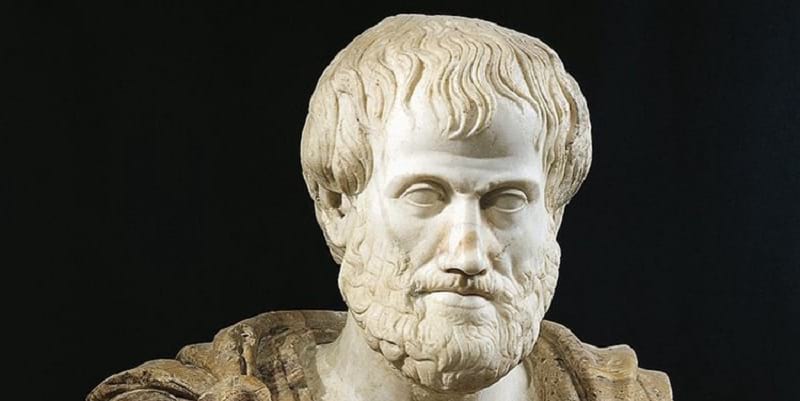Aristotle biography and quotes

Aristotle, born in 384 BCE was a Greek philosopher and scientist. He is considered to be one of the greatest minds from Western history. Aristotle created a scientific method that’s used for research. Even after thousands of years of more research, his method is still used in present-day science and philosophy. This article covers his biography and his quotes.
Who was Aristotle? His biography
Aristotle was born in Stagira, Chalcidice, ancient Greece. His father Nicomachus was an important doctor who was well connected socially. Unlike many other great thinkers of his time, Aristotle was not a member of the highly regarded Athens aristocracy. He wasn’t even a citizen.
It was thanks to his father that Aristotle developed a strong interest in the sciences. Many of the circumstances and facts have been lost, but some think Aristotle’s father served as a physician to Amyntas II in the Macedonian court. It’s possible that Aristotle spent part of his childhood in those royal surroundings. After his father died young, his guardian provided Aristotle with an excellent education.
When he was 17 years old, Aristotle moved to Athens, Greece. There he joined Plato’s circle at the Academy until Plato’s death in 347 BCE. Aristotle was an exceptionally apt student and soon started lecturing rhetoric.
During his 20 years at the philosophers’ academy, Aristotle had developed a lot of respect and admiration for Plato, but their differences led to a breakdown in their relationship. Eventually, another successor for Plato was found, and Aristotle was presented to Plato’s nephew, Speusippus.
Because he no longer had a future at the Academy, Aristotle moved to Assos in Mysia after Plato’s death. A region that is known as Turkey today. He and Xenocrates joined a group of Plato followers there, known as the Platonists. This group had established itself there under Hermias, ruler of Atarneus.
In Assos, Aristotle conducted extensive research into zoology and marine biology. Although he never claimed to have started the science of zoology, his observations and conclusions were completely unprecedented. Many believe that Aristotle had to have had a remarkably keen sense of vision, as many of his observations and ideas were not confirmed until after the invention of the microscope in the 17th century.
During this period, Aristotle married Hermias’ niece, a woman named Pythias. Three years later, Hermias came under attack by the Persians, and they murdered Aristotle’s wife.
In the year 342 BCE, Aristotle travelled to the court of Philip of Macedon. There, he became the mentor of Alexander, who would one day rule the entire Persian empire and is since known as Alexander the Great.
He taught Alexander for seven years, after which the young man was crowned king. Not much is known about the subject matter he presented to Alexander, but a letter from the philosopher Alexander shows that he already had the ambition to become leader of the Greeks during the time when he was being educated by Aristotle.
In 335 BCE, Aristotle returned to Athens. There he founded his own school for philosophy, under the protection of the Antipater, a representative of Alexander in Athens. The Peripatetic School, the school’s name, was located near a shrine to Apollo Lyceus. At the school, Aristotle taught lessons that were divided into morning and afternoon sessions. The most complex lectures were given in the morning, the popular and easier ones took place in the afternoon. One of his famous theories is the Aristotle Model of Communication: a communication processs model from speaker to effect.
He divided his lessons into three groups. Practical, theoretical and productive sciences. The practical lectures involved the fields of biology, maths and physics. Theoretical lessons included metaphysics and the study of the soul. Productive philosophy focused on trades, agriculture and art.
It is said that Aristotle continually paced back and forth across the practice grounds surrounding the Lyceum. This habit inspired the term peripatetic philosophy, which roughly translates as ‘walking around philosophy’. Aristotle would continue to actively teach at the Lyceum for twelve years. In the end, he appointed Theophrastus to become his successor.
Aristotle led the school until the death of Alexander in 323 BCE, after which he fled Athens concerned about his safety. The assembly in Athens declared war on Alexander’s successor, Antiphon. Aristotle was then considered as anti-Athens and pro-Macedon. He was accused of heresy and decided to play things safe.
He voluntarily left for Chilkis, Greece, where he died a year later in 322 BCE as a result of intestinal illness. His testament, saved in the writings of Diogenes Laertius, said that his possessions were to be divided between his daughter Pythias and his son Nicomachus, as well as his personal slaves.
Aristotle’s works in philosophy, logic, science, ethics, politics and metaphysics remain of immense value. His theory influenced Medieval churches and remain highly relevant to this very day. Some of the concepts he started with, became the foundation of Newton’s laws of motion.
Famous Quotes
- “Poverty is the parent of revolution and crime.”
- “Gratitude quickly ages.”
- “It is during our darkest moments that we must focus to see the light.”
- “The roots of education are bitter, but the fruit is sweet.”
- “Anybody can become angry – that is easy, but to be angry with the right person and to the right degree and at the right time and for the right purpose, and in the right way – that is not within everybody’s power and is not easy.”
- “There is no great genius without some touch of madness.”
- “At his best, man is the noblest of all animals; separated from law and justice he is the worst.”
- “The aim of the wise is not to secure pleasure, but to avoid pain.”
- “Whosoever is delighted in solitude is either a wild beast or a god.”
- “Courage is the first of human qualities because it is the quality which guarantees the others.”
- “Knowing yourself is the beginning of all wisdom.”
- “It is the mark of an educated mind to be able to entertain a thought without accepting it.”
- “What is a friend? A single soul dwelling in two bodies.”
How to cite this article:
Janse, B. (2019). Aristotle. Retrieved [insert date] from Toolshero: https://www.toolshero.com/toolsheroes/aristotle/
Original publication date: 06/10/2019 | Last update: 11/16/2023
Add a link to this page on your website:
<a href=”https://www.toolshero.com/toolsheroes/aristotle/”>Toolshero: Aristotle</a>






